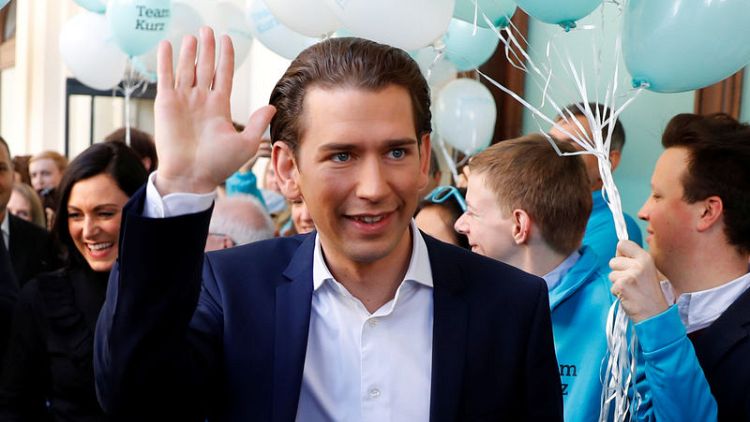By Francois Murphy
VIENNA (Reuters) - Austrian conservative Sebastian Kurz ate the far right's lunch two years ago with a hardline immigration policy, then formed a coalition with them, only to ditch them after a video sting scandal. Now he is set to lead the country again at just 33.
There is little doubt the former chancellor and his party will win Sunday's parliamentary election. But he is an increasingly polarising figure and he has already collapsed two governments, one with each of the two parties that could give him a solid majority in parliament. Can he keep going?
Conservatives across Europe, particularly in Germany, are watching to see what their rising star does next. Where they are often threatened by the far right, Kurz has tamed it by fishing in its waters. But he could very well change direction.
"There are so many faces of Kurz," the leader of the Greens, Werner Kogler, with whom Kurz will likely try to form a three-way coalition after the Sept. 29 election, told Reuters. "I believe he is relatively free of ideology and of ideas."
That is a view widely held inside the political bubble, and less so outside it.
"He is an excellent performer with a very professional public relations machine. He is, so to speak, the perfect clone. Content-wise there is nothing specifically original to him unless you consider his noticeable youth to be content," political analyst Anton Pelinka said.
That is, however, part of his success. Before the last election in 2017, in the wake of Europe's migration crisis, he stuck relentlessly to one theme - immigration - arguing that new arrivals threatened Austria's welfare state.
His line was so close to what the far-right Freedom Party (FPO) was saying that it accused him of plagiarism, but it worked. His People's Party (OVP) overtook the FPO, which had been top of the polls. The FPO finished third, then became the OVP's junior coalition partner.
He has since adopted a populist tone reminiscent of Britain's Brexiteers by pitting the public against parliament, which voted Kurz and his government out of office in May. Opposition parties argued that Kurz should share the blame after a sting scandal felled the FPO leader he brought to power.
Kurz's former Vice Chancellor Heinz-Christian Strache had been caught on video offering to fix state contracts with a woman posing as a Russian oligarch's niece. Strache quit, hoping to save the coalition, which soon collapsed.
"Parliament decided today but at the end of the day, in September, in a democracy the people decide," he said at the time. "I am looking forward to that."
THREE STRIKES AND HE'S OUT?
Kurz will need to form a coalition to control parliament, and while he could easily ally with the far right again he has good reason to turn his back on it after the Ibiza video sting scandal. He has emerged largely unscathed from that, but reviving their alliance could hurt his image at home and abroad.
While immigration remains an issue, polls show voters' top concern is now the environment, on which Kurz has offered little of substance, and there has been a large swing towards the Greens from the Social Democrats. A three-way tie-up with the Greens and liberal Neos should give him a solid majority.
For now, he is still courting far-right voters - even recycling a slogan of former far-right leader Joerg Haider on campaign posters: "A man who speaks our language".
"People often come up to me at events and say they don't feel at home in their own neighbourhood. They almost feel foreign where they live ... We must keep fighting illegal immigration," Kurz told a rally last week, even though arrivals have collapsed in recent years.
It is hard to reconcile many of his positions with the left-wing Greens', who vehemently oppose Kurz's cuts to benefits for new immigrants.
But he will have to govern with someone, and his main concern will likely be durability rather than ideology, having also pulled the plug on a coalition with the Social Democrats in 2017. With the FPO leadership split over working with Kurz after he turned on them, he is even more likely to look elsewhere.
"Sebastian Kurz needs to govern for a full five years," political analyst Thomas Hofer said, pointing to the FPO split. "To call a snap election a third time would I think be too much even for him."
(Additional reporting by Alexandra Schwarz and Leonhard Foeger; Editing by Giles Elgood)
